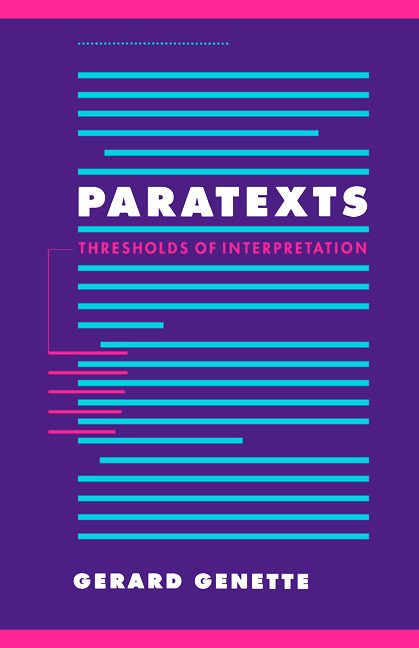Gérard Genette: Paratexts: Thresholds of Interpretation (1987/1997)
Filed under book | Tags: · aesthetics, literary theory, literature, paratext, text, writing

“Paratexts are those liminal devices and conventions, both within and outside the book, that form part of the complex mediation between book, author, publisher and reader: titles, forewords, epigraphs and publishers’ jacket copy are part of a book’s private and public history. In this first English translation of Paratexts, Gérard Genette shows how the special pragmatic status of paratextual declaration requires a carefully calibrated analysis of their illocutionary force. With clarity, precision and an extraordinary range of reference, Paratexts constitutes an encyclopedic survey of the customs and institutions as revealed in the borderlands of the text. Genette presents a global view of these liminal mediations and the logic of their relation to the reading public by studying each element as a literary function. Richard Macksey’s foreword describes how the poetics of paratexts interact with more general questions of literature as a cultural institution, and situates Genette’s work in contemporary literary theory.”
Originally published in French as Seuils, Éditions du Seuil, Paris, 1987
Translated by Jane E. Lewin
Foreword by Richard Macksey
Publisher Cambridge University Press, 1997
Literature, Culture, Theory series, 20
ISBN 0521424062, 9780521424066
456 pages
Review: Chris Koenig-Woodyard (erudit, 1999).
Comment (0)Florian Cramer: Exe.cut(up)able statements: Poetische Kalküle und Phantasmen des selbstausführenden Texts (2011) [German]
Filed under book | Tags: · aesthetics, algorithm, avant-garde, code, code poetry, experimental literature, history of literature, information aesthetics, kabbalah, literature, net art, poetry, software, text, theory

“From the antiquity to today, there has been poetry that literally performs computations, processing its own letters. Prototyped by magic and Pythagorean mathematical aesthetics, it encompasses such diverse forms as kabbalist and Lullist language combinatorics, word permutation poetry, ludistic poetry, computational text collage, aleatoric, stochastic and recursive texts, Oulipian constraints, computer-generative literature, poetry in programming languages, and codeworks. Just like visual and sound poetry poetize the graphetic and phonetic dimensions of words, these writings show that computation is a dimension of language. On top of that, their poetics is rife with speculative and contradictory programs: often one and the same text form is at once being instrumentalized for total art and anti-art, mysticism and technicism, order and chaos. This has resulted in a fantastic literature whose speculative imagination manifests itself in the arrangement of letters rather than the semantics of the text. The book includes close readings of a 17th century sonnet (Quirinus Kuhlmann’s “XLI. Libes-kuss”), a 20th century musical composition (Alvin Lucier’s “I am sitting in a room”) and a 21st century net.art codework (mez breeze’s “_Viro.Logic Condition][ing][ 1.1_”), and discusses limitations of existing literary and media theory for criticism of these works.
A shorter, less scholarly English-language mutant of this book has been electronically published in 2005 as Words Made Flesh: Code, Culture, Imagination.”
Publisher Wilhelm Fink Verlag, October 2011
343 pages
Note: the book has just become free for Open Access publishing and is offered here for download in its manuscript version, licensed under Creative Commons Attribution Unported 3.0.
Comment (0)Hal Foster (ed.): The Anti-Aesthetic: Essays on Postmodern Culture (1983)
Filed under book | Tags: · aesthetics, art criticism, cultural criticism, literature, postmodern, postmodernism, representation, theory

“A collection of late-twentieth-century cultural criticism, named a Best Book of the Year by the Village Voice. In The Anti-Aesthetic, critics such as Jean Baudrillard, Rosalind Krauss, Fredric Jameson, and Edward Said consider the full range of postmodern cultural production, from the writing of John Cage, to Cindy Sherman’s film stills, to Barbara Kruger’s collages. The book provides an introduction for newcomers and a point of reference for those already engaged in discussions of postmodern art, culture, and criticism.”
With essays by Jean Baudrillard, Douglas Crimp, Kenneth Frampton, Jurgen Habermas, Fredric Jameson, Rosalind Krauss, Craig Owens, Edward W. Said, and Gregory L. Ulmer.
Edited and with an Introduction by Hal Foster
Publisher Bay Press, Port Townsend, WA, 1983
ISBN 0941920011, 9780941920018
xvi+159 pages
Reviews: Dana Polan (New German Critique, 1984), Laura Kipnis (Minnesota Review, 1984).
PDF (15 MB, updated on 2015-5-5)
Comment (0)
